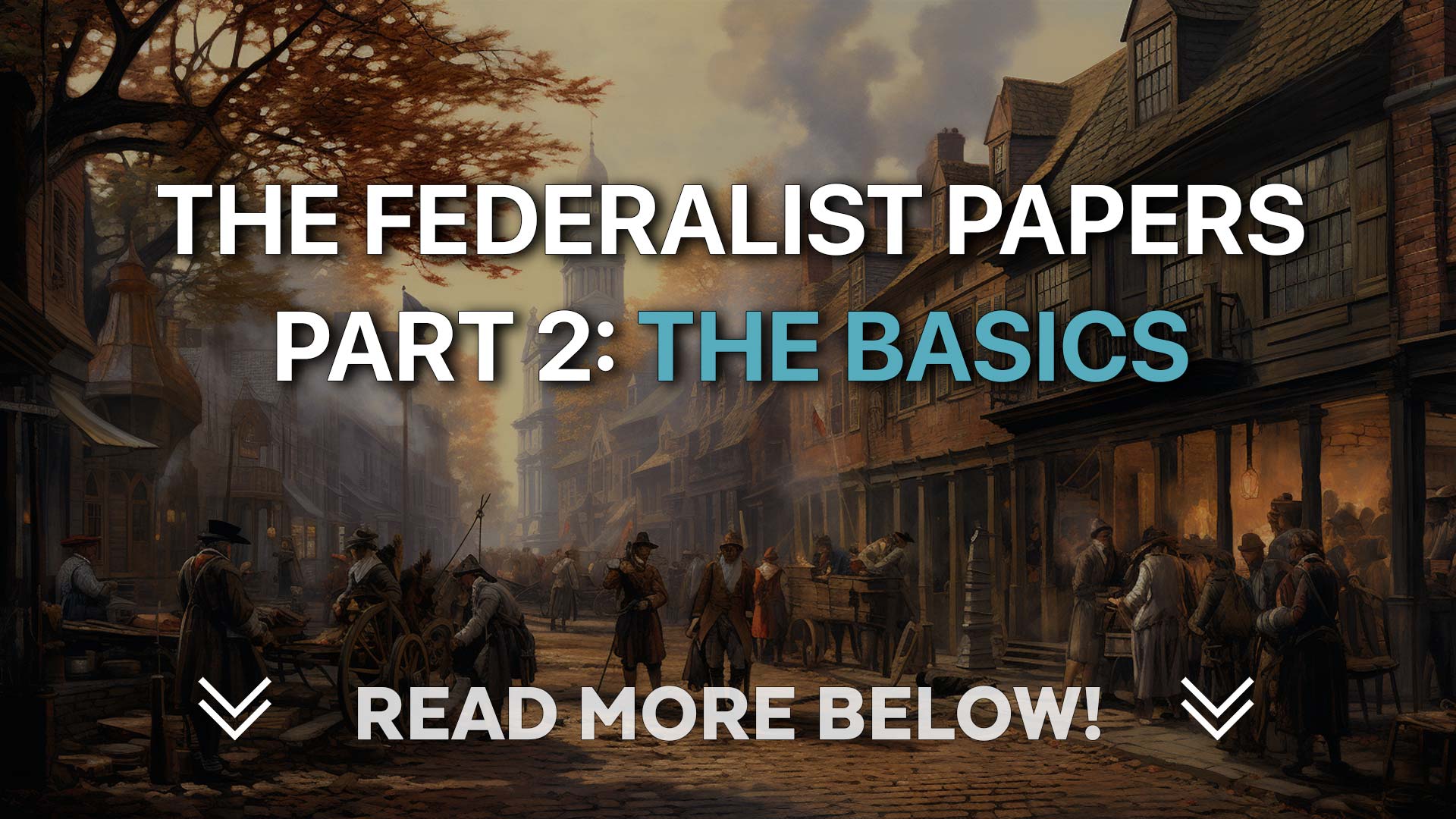Navigating the Pages of History: An Introduction to the Federalist Papers
Most of America has never heard of the Federalist Papers, let alone understood how they shaped our country. They are no longer taught in schools, and many of our public servants don’t even know what I’m about to discuss here and in the upcoming posts. Starting with an introduction to the Federalist Papers in this post, I will, in subsequent posts, address the issues we face as a country now. By embracing the wisdom of our founders as articulated in these papers and the Constitution, we might avoid our current predicaments. While our founders were not without flaws, their brilliance is undeniable. Let’s briefly discuss what the Federalist Papers are in this post and delve into specifics in future posts.
The Basics:
In the pivotal years following the American Revolution, as our young nation sought to define its identity, the Federalist Papers emerged as a beacon of wisdom. Written between 1787 and 1788 by Alexander Hamilton, James Madison, and John Jay under the collective pseudonym “Publius,” these 85 essays brilliantly advocated for the ratification of the United States Constitution. Set against the backdrop of a post-revolutionary America, these writings delve deep into the principles of governance, the essence of our Constitutional Republic, and the balance of power. In the wake of the Articles of Confederation’s evident weaknesses, the Constitutional Convention convened in 1787 to address and rectify its shortcomings. A draft of a new Constitution emerged, but the people—and indeed, the states—needed to be convinced of its merits.
With the gravity of that situation in mind, Hamilton, Jay, and Madison—set forth to elucidate the reasoning behind the proposed Constitution, endeavoring to win public support. Thus, were born the Federalist Papers. Let’s briefly dive into what the Federalist Papers are, what they did, do, and why they are so important.
The Authors:
Alexander Hamilton, a fellow with an unmatched vigor and keen insight into matters financial and administrative, penned no fewer than fifty-one of these papers.
James Madison, a scholar and advocate of liberty, diligently wrote twenty-nine.
John Jay, who was limited by illness yet whose prose is invaluable, contributed a respectable five.
Anonymity – A Shield against Prejudice:
In an era where personal prejudices could overshadow the merit of an argument, the Federalist Papers were published under the pseudonym “Publius.” This collective identity served a dual purpose: not only did it shield their individual reputations, but it also allowed the focus to remain on the arguments themselves, rather than the authors behind them. Publius, thus, stands as a symbol of unity, of collective wisdom transcending individual ego.
Echoes of Tyranny – The Shadow of King George:
The urgency for a new Constitution, as proposed, did not arise in a vacuum. The founders had collectively borne the brunt of King George’s tyranny. Arbitrary taxes, dismissal of colonial rights, and incessant interferences painted a vivid picture of the dangers of unchecked power. These experiences with the Crown’s oppression emphasized the need for a system where no single entity held disproportionate sway.
The Complete Federalist – A Grand Collection:
In total, the Federalist Papers comprise 85 essays, each a testament to the dedication they held towards the establishment of a new, more perfect union. These writings serve as a comprehensive defense and elucidation of the Constitution’s every article and clause.
Ultimate Goal – The Balance of Power:
Above all, the primary intent of both the Federalist Papers and the Constitution is the idea of the separation of powers. Drawing upon Montesquieu’s wisdom, the design of our government seeks to ensure that no single branch – be it the executive, legislative, or judiciary – would amass unchecked power. Madison wisely noted, “Ambition must be made to counteract ambition.”
Our Constitution, therefore, is structured to have each branch act as a check and balance against the others. This design is not merely for the sake of efficiency, but as a bulwark against tyranny, ensuring that the United States remains forever a beacon of liberty and democracy.
Sentiment and Reasoning:
The overarching sentiment of the Federalist Papers is one of union, strength, and collective prosperity. As Madison aptly put it, “If men were angels, no government would be necessary.” It’s the imperfections inherent in humanity that necessitate a robust and balanced governmental structure.
Hamilton often emphasized the dangers of factionalism and the need for a strong centralized authority to maintain order and stability. Jay focused on the benefits of a united nation in foreign relations and defense.
Importance Then:
The Federalist Papers sought to quell the fears of Anti-Federalists and other skeptics, making the case for the Constitution’s ratification. The arguments presented were not mere theoretical expositions; they were instrumental in persuading the people of New York—and by extension, the nation—to adopt the Constitution.
Importance Today:
For judges and legislators of our modern age, the Federalist Papers serve as a guiding compass. They provide invaluable insights into the framers’ intent, offering clarity when the text of the Constitution may seem ambiguous.
For the people, these Papers are a testament to the rigorous thought and debate that laid the foundation of our great Republic. It serves as a reminder that, in the words of Hamilton, “Real liberty is neither found in despotism or the extremes of democracy, but in moderate governments.”
In Conclusion:
It must have been a truly humbling endeavor for our founders to craft the nation’s foundation. The Federalist Papers, echoing the hardships under King George and the aspirations of a free people, articulate the essence of the Constitution. The documents underscore the importance of unity, the lessons learned from tyranny, and the evergreen principle of the separation of powers.
As we reflect upon these tenets, let us remember the sacrifices made and the foresight employed to ensure our Republic’s endurance. Let these Papers be the North Star for all who seek to understand, preserve, and further our great Constitutional Republic experiment.
I urge you to reflect upon the wisdom contained within the Federalist Papers. They remind us of our collective identity, the importance of unity, and the ever-relevant principles upon which our nation was built.
In the immortal words of Benjamin Franklin, when asked what sort of government the framers had given the nation, he responded, “A republic, if you can keep it.” Let the Federalist Papers be our guide in preserving and nurturing that very republic.
In the next post, I’ll dive into the Federalist Papers and expose what our founders said about the government’s role in our economy should be, vs what it is today.
Beadles
P.S.
“Those who cannot remember the past are condemned to repeat it.”




